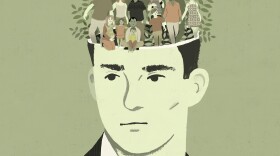
Rhaina Cohen
Rhaina Cohen is an associate producer for the social science show Hidden Brain. She's especially proud of episodes she produced on why sexual assault allegations are now being taken seriously, on obstacles to friendship that men face and why we rehash difficult memories.
She got her start in public radio as an intern for Planet Money. Before entering the audio world, Cohen was part of the production team for ABC News' This Week with George Stephanopoulos. She also worked as a research assistant for Rebecca Traister on the New York Timesbestselling book All The Single Ladies: Unmarried Women and the Rise of an Independent Nation,and for Peter Slevin on the biography Michelle Obama: A Life.
As a Marshall Scholar, Cohen received a master's in comparative social policy from Oxford (and while there, competed in a dance style that hasn't yet gained ground in the United States: acrobatic rock'n'roll). She holds a bachelor's degree in American studies from Northwestern University. In college and graduate school she researched family policies, traveling to Denmark, Iceland and a U.S. military base. As a 2018 , she studied journalism ethics in Germany and Poland.
-
There's a core belief embedded in the story of the United States: the American Dream. The possibility of climbing the economic ladder is central to that dream. This week we speak with Raj Chetty, one of the most influential economists alive today, about the state of economic mobility in the U.S. and whether the notion of the American Dream is still useful. For more information about the research in this episode, visit https://n.pr/2z8cvSs.
-
Nearly a quarter century ago, a group of women accused a prominent playwright of sexual misconduct. For the most part, the allegations went nowhere. In 2017, in the midst of the #MeToo movement, more women came forward to accuse the same playwright of misconduct. This time, everyone listened. On this episode — originally broadcast in February 2018 — we explore the story through the lens of social science research and ask, "Why Now?" What has changed in our minds and in our culture so that allegations of sexual harassment and assault are being taken more seriously than they were in the past? A note: This story includes descriptions of sexual harassment and assault. It may not be suitable for all listeners.
-
Decades ago, a group of women accused a prominent playwright of sexual misconduct. For the most part, the complaints went nowhere. In 2017, more women came forward. This time, people listened.
-
Violent crimes committed by Muslims are much more likely to be reported as "terrorism." And that has disturbing consequences for the way Muslims are perceived.
-
A culture of racism can infect us all. On this week's radio show, we discuss the implicit biases we carry that have been forged by the society around us.
-
Women in the Middle Ages were excluded from many realms: the law, universities, and surprisingly, from friendship. Clearly, that's changed — and Kayleen Schaefer's new book examines how and why.






